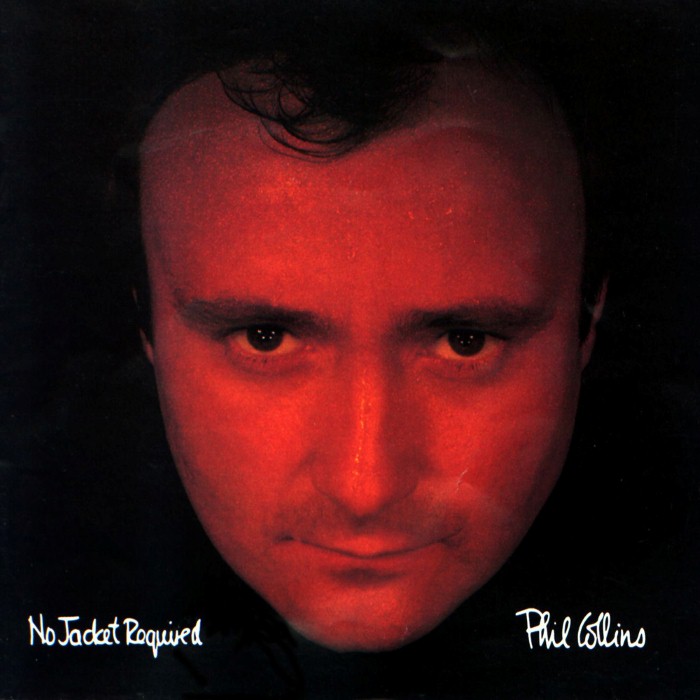No Jacket Required by Phil Collins

No Jacket Required is the third solo album by English singer-songwriter Phil Collins, released on 25 January 1985. The album was named after an incident at The Pump Room in Chicago, where Collins was denied admittance to the establishment because of his attire. No Jacket Required features guest vocalists, including Helen Terry, Peter Gabriel and Sting. Some of the songs, like "Don't Lose My Number" and "Sussudio", were based around improvisation. Other songs, like "Long Long Way to Go", had a political message. "One More Night", "Sussudio", "Don't Lose My Number", and "Take Me Home" were released as singles, with corresponding music videos. All four singles were top-ten hits in the Billboard Hot 100, with "Sussudio" and "One More Night" reaching number one. The three singles that were released in the UK all reached the top 20 on the UK charts. The album was positively received and won three Grammy Awards including for Album of the Year in 1986. Stephen Holden of The New York Times said that Collins was "quietly revolutionising and expanding the role of the drums in pop record making". Rolling Stone reviewer David Fricke said that, "Like his '81 and '82 outings, Face Value and Hello, I Must Be Going!, No Jacket Required is not an album that waits to be liked". Collins' most commercially successful album, No Jacket Required went to number one in several countries, including the United States (where it was at the top of the charts for seven weeks), United Kingdom and Canada. According to the RIAA, the record sold over twelve million copies in the US, and in the UK, the album sold over two million copies, and was certified 6× platinum. Worldwide, the album has sold over 25 million copies. Many of the songs, including "Take Me Home", and "Long Long Way to Go", have been used in episodes of Miami Vice and Cold Case, and "The Man with the Horn" was re-written and re-recorded for the episode "Phil the Shill". "We Said Hello Goodbye" was re-recorded for the movie Playing for Keeps. Following the release of the album Collins embarked on the successful No Jacket Required World Tour. At the end of the tour, Collins received critical acclaim for performing at both the London and Philadelphia Live Aid concerts on 13 July 1985. During the tour, Collins recorded a song with Marilyn Martin for the movie White Nights, called "Separate Lives", which was a number one hit in the US, and a top ten hit in the UK. Remixes of six songs from the album were later included on the 12"ers compilation.
In the early ’80s, Phil Collins commandeered Genesis’ transition from prog-rock figureheads to Top 40 hit machine, while launching his own immensely successful solo career. But 1985 was truly the Year of the Phil, when, in the wake of Genesis’ self-titled 1983 chart-topper and his own GRAMMYⓇ-winning theme song for the film <i>Against All Odds</i>, Collins dropped his blockbuster third record, <i>No Jacket Required</i>. The album not only served as the height of Collins’ incomparable ‘80s hot streak, it also became a defining sonic document of the era—with all the sax solos, squealing guitars, glossy synths and percolating programmed drum beats to prove it.<br /> Up to this point in his solo career, Collins tended to vacillate between reverential ‘60s-retro homage and modern production techniques, but <i>No Jacket Required</i> effortlessly fused the two into a glitzy Motown-meets-MTV sound every bit as funky and frisky as what pop juggernauts like Madonna, Prince and Michael Jackson were pumping out at the time. On irresistible opener “Sussudio” and its similarly styled companion “Who Said I Would”, Collins proved that he too could party like it’s 1999, with synth stabs and brass jabs that thrust you onto the dance floor with all the subtlety of an electric cattle prod. The album also reinforced Collins’ status as a master balladeer, whether he was slinking into the soft-focus romantic reverie “One More Night” or wading into politically charged terrain on the equally exotic and ominous “Long Long Way to Go”. But on a record where every song could’ve been a hit single—and half of them actually were—Collins saves the best for last with the towering “Take Me Home”. It’s a track that perfectly encapsulates his ‘80s imperial phase, where even a song that grimly details a man’s descent into madness couldn’t help but sound like a heaven-sent inspirational anthem.
